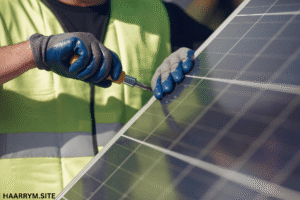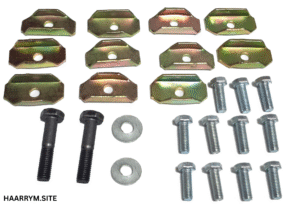As environmental concerns rise and energy costs soar, more homeowners are turning to renewable energy—particularly solar power. One of the most accessible ways to make the switch is by investing in a home solar installation kit. These kits provide a DIY-friendly path toward energy independence, reduced utility bills, and a more sustainable lifestyle.
This 2025 guide will cover everything you need to know about home solar installation kits: what they include, how they work, their benefits, costs, types, and tips for choosing the right one for your home.
What Is a Home Solar Installation Kit?
A home solar installation kit is a pre-packaged bundle of equipment designed to let you install a solar power system on your own. Kits are available for both grid-tied and off-grid applications, ranging from small setups for RVs or cabins to full-sized systems capable of powering an entire house.
What’s Included in a Solar Kit?
Most home solar kits come with:
-
Solar Panels – Capture sunlight and convert it into electricity.
-
Inverter – Converts DC (direct current) electricity from the panels into AC (alternating current) for household use.
-
Mounting Hardware – Includes rails, brackets, and clamps for attaching panels to a roof or ground structure.
-
Charge Controller – Used in off-grid systems to regulate voltage and protect battery storage.
-
Battery Storage (optional) – Stores excess energy for nighttime or cloudy days.
-
Cabling and Connectors – Necessary wires and connectors to link all components.
-
Installation Manual – Step-by-step guide for setting up the system.
Benefits of Installing a Home Solar Kit
1. Lower Energy Bills
Generating your own electricity can significantly reduce or eliminate your monthly utility costs. Most homeowners break even within 5 to 7 years.
2. Energy Independence
Especially beneficial in remote areas or during outages, solar kits allow you to rely less—or not at all—on the utility grid.
3. Eco-Friendly Power
Solar is a clean, renewable energy source that reduces your carbon footprint and helps combat climate change.
4. Increased Home Value
Homes with solar systems tend to sell faster and at higher prices compared to non-solar properties.
5. Incentives & Tax Credits
Federal and local governments offer rebates, tax credits, and other incentives, making solar more affordable than ever.
Types of Home Solar Installation Kits
1. Grid-Tied Solar Kits
Connected to your local utility grid. Excess energy can be fed back for credit via net metering.
-
✅ Pros:
-
Lower upfront cost
-
No batteries required
-
Eligible for net metering
-
-
⚠️ Cons:
-
Dependent on the grid
-
Won’t work during outages unless paired with batteries
-
2. Off-Grid Solar Kits
Completely independent from the utility grid, ideal for remote locations or total energy autonomy.
-
✅ Pros:
-
Full energy independence
-
Ideal for rural or isolated homes
-
-
⚠️ Cons:
-
Higher initial cost
-
Requires efficient energy management
-
3. Hybrid Solar Kits
Combine the benefits of both systems. Connected to the grid with battery backup for outages.
-
✅ Pros:
-
Best of both worlds
-
Provides backup power
-
-
⚠️ Cons:
-
More expensive than grid-tied kits
-
How to Choose the Right Solar Kit for Your Home
Consider these key factors before purchasing:
🔋 1. Your Energy Needs
Check your electricity bill to find your monthly kWh usage—this determines how many panels you’ll need.
🏡 2. Available Roof or Ground Space
Measure the installation area. Evaluate factors like sun exposure, angle, and shading.
💵 3. Budget
Home solar kits range from $1,000 to $20,000+ depending on size, components, and battery inclusion.
🌤️ 4. Local Climate
More sunlight = better efficiency. Cloudy areas might need larger systems or battery backups.
🧰 5. Skill Level
Many kits are DIY-friendly, but if you’re not comfortable with basic electrical work, consider hiring a professional.
DIY vs. Professional Installation
🔧 DIY Installation
Most kits are designed for self-installation and include pre-wired components and manuals.
-
✅ Pros:
-
Lower total cost
-
Hands-on understanding of your system
-
Sense of accomplishment
-
-
⚠️ Cons:
-
Time-consuming
-
Requires electrical knowledge
-
Mistakes can be costly or dangerous
-
👷♂️ Professional Installation
Hiring a licensed installer ensures safety, speed, and compliance with local codes.
-
✅ Pros:
-
Safe and fast setup
-
Usually comes with workmanship warranties
-
May be required for certain tax credits
-
-
⚠️ Cons:
-
Adds $2,000–$8,000 to the total cost
-
2025 Solar Kit Cost Estimates
Thanks to improved technology and manufacturing, solar kits in 2025 are more affordable than ever.
| Kit Size | Power Output | Cost Range |
|---|---|---|
| Small Kit | 1–3 kW | $1,500 – $4,000 |
| Medium Kit | 4–7 kW | $5,000 – $10,000 |
| Large Kit | 8–10+ kW | $11,000 – $20,000+ |
Optional Add-Ons:
-
Battery Storage: $4,000 – $15,000
-
Professional Installation: $2,000 – $8,000
Top Solar Kit Brands in 2025
Some of the most trusted solar kit brands this year include:
-
Renogy
-
Grape Solar
-
Eco-Worthy
-
Bluetti (great for portable and hybrid systems)
-
Tesla Powerwall-Compatible Kits (available via third-party resellers)
✅ Look for certifications like UL, IEC, and strong warranty coverage before you buy.
Financing Options & Government Incentives
Thanks to continued support, homeowners can offset up to 40% or more of their total costs through incentives.
U.S. Incentives:
-
Federal Solar Investment Tax Credit (ITC): 30% off total system cost
-
State & Local Rebates
-
Net Metering Programs
-
Solar Renewable Energy Certificates (SRECs)
Financing Options:
-
Solar Loans
-
Leasing Programs
-
Power Purchase Agreements (PPAs)
Conclusion: Should You Get a Solar Kit in 2025?
In 2025, a home solar installation kit is one of the smartest investments a homeowner can make. Whether you’re looking for energy savings, grid independence, or a cleaner lifestyle, there’s a solar kit that fits your needs and budget.
With a wide variety of kits available—from compact DIY solutions to full-house hybrid systems—going solar has never been easier. Just assess your energy needs, installation space, and comfort level with DIY projects before making your purchase.
🌞 Ready to reduce your electricity bills and go green? A solar panel kit for home use might be your perfect starting point.
✅ Meta Description:
Explore everything about home solar installation kits in 2025—benefits, costs, types, top brands, and tips for choosing the best kit for your house. Perfect for DIYers and green-minded homeowners.

